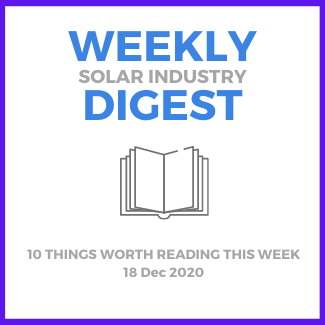The Fed Reserve Board joined the Network for Greening the Financial System, a group of central banks that manages climate change’s financial risks and pushes mainstream finance toward a sustainable economy. It’s required to allow the US to join the Paris Climate Accord.
Lead-acid vs. Lithium Battery? Lead-acid batteries are cheaper upfront with a shorter lifespan and need regular maintenance while lithium batteries are much pricier upfront and are maintenance-free and have a longer lifespan. See the full comparison at Unbound Solar.
Michael Regan is expected to be the Biden-Harris transition team’s pick for admin of the EPA. Regan is the current head of North Carolina’s Department of Environmental Quality and worked at the EPA under the Clinton and George W. Bush administrations on energy and air quality.
Problem: a commercial solar project is not visible to the public. Solution: Yaskawa Solectria’s SolrenView, a monitoring dashboard that allows commercial customers to view impressive stats of a system via a simple dashboard in lobbies or waiting rooms for the public to access.
Q3 installs totaled 3.8 GW, up 46% year-over-year and accounting for 43% of all new electrical gen installs. This means 2020 could become the third-largest year for solar. Utility sector accounted for 2.7 GW and residential sector was at 738 MW, up 14% from Q2.
The new sonnenCore battery review: it has a max power rating of 8.6 kW and 10 kWh usable capacity, a roundtrip efficiency of > 85%, strong 100% depth of discharge, and a 10-year/10,000 cycle product and performance warranties, with cost starting at $9,500.
Study lays out a $2.5T plan for a net-zero carbon America. It talks about the huge investment in renewables and significant shifts in transport, heating, energy, building and industry. 5 pathways range from a total shift to renewables to nuclear power, carbon capture, and storage.
To create more transparency, allow stakeholders to adjust to utility response, and push for active change re the consequences of climate change, utilities should disclose the financial risks they face due to climate change. NY’s Public Service Commission has started this push.
Homeowners will be more likely to view solar as a piece in a bigger total solution that includes panels, battery storage, energy efficiency upgrades and an EV. Why? Going solar is much cheaper and seen as safe and environmentally friendly while EVs are more popular.
The DOE is awarding $45 million for solar hardware and systems integration research. It includes a consortium focused on developing control tech for a modernized grid. They want applications that will bring large quantities of solar to the grid via US-made hardware.
